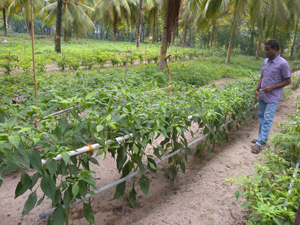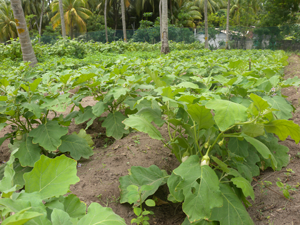 Coconut is the only crop grown extensively in high density in Lakshadweep group of islands. Apart from coconut, the islanders were fully dependent on mainland supply chain for their fruits and vegetable requirements as the cultivation of these are not their traditional practice. Considering the fragile nature of the island ecosystems, the use of chemical fertilizers and other inorganic inputs are also not been advocated in the islands. In the rainy season, the timely arrivals of supplies from mainland through ships are also affected resulting in non-availability of fruits and vegetables.
Coconut is the only crop grown extensively in high density in Lakshadweep group of islands. Apart from coconut, the islanders were fully dependent on mainland supply chain for their fruits and vegetable requirements as the cultivation of these are not their traditional practice. Considering the fragile nature of the island ecosystems, the use of chemical fertilizers and other inorganic inputs are also not been advocated in the islands. In the rainy season, the timely arrivals of supplies from mainland through ships are also affected resulting in non-availability of fruits and vegetables.
Tribal Sub Plan Project
Screening of improved varieties from NARS and scaling up production through the Tribal Sub Plan Project of Indian Council of Agricultural Research contributed to the increased availability of fruits and vegetables. Intensified efforts taken up by Central Plantation Crops Research Institute (CPCRI), Kasargod yielded fruits in identifying the most suitable varieties of fruit crops viz., banana, papaya, sapota and vegetables crops viz., tomato, brinjal, chilli, bhindi, amaranth, cabbage, cauliflower, cucurbits, moringa for island conditions of Minicoy. Large scale production of vegetables and fruits has become the most important activity of the CPCRI centre at Minicoy Island to cater the needs of island community in meeting the food and nutritional security. The institute has successfully demonstrated organic fruits and vegetable production at the centre with optimum utilization of available resources through organic methods under coconut gardens and made available fruits and vegetables to the islanders throughout the year.
Improved Varieties
Among the banana varieties evaluated under organic cultivation, ‘Saba’ recorded higher bunch weight ranged from 18kg to 23kg followed by ‘Udayam’ and ‘Robusta’ with average bunch weight of 16kg and 18kg respectively. The suckers of these varieties have been distributed to the islanders for growing under coconut gardens. Papaya varieties viz., Arka Prabhath and Arka Surya were introduced and successfully grown under island conditions. Among the sapota varieties grown as mixed crop in coconut gardens, PKM 2 performed better with higher fruit yield of over 35 kg per tree per year with medium sized canopy making it suitable for mixed crop in coconut gardens.
 Growing of improved varieties of Tomato (Arka Meghali, Arka Alok, CO 3), Brinjal (Arka Anand and CO 2), Chilli (Arka Lohit, Arka Harita, and CO 4), Bhindi (Arka Anamika), Amaranth (Arka Arunima, Arka Samraksha), Cabbage (Ankura manas), Cauliflower (F 1 Hybrid white), Bitter gourd (Ventura), Pumpkin (Arka Chandan and Arka Suryamukhi), Cowpea (Arka Garima) and Moringa (PKM 1) were successfully demonstrated at the centre in an area of about 35 cents of coconut garden with different organic inputs such as poultry manure, cow dung, coconut leaf Vermicompost, neem cake and Pongamia cake.
Growing of improved varieties of Tomato (Arka Meghali, Arka Alok, CO 3), Brinjal (Arka Anand and CO 2), Chilli (Arka Lohit, Arka Harita, and CO 4), Bhindi (Arka Anamika), Amaranth (Arka Arunima, Arka Samraksha), Cabbage (Ankura manas), Cauliflower (F 1 Hybrid white), Bitter gourd (Ventura), Pumpkin (Arka Chandan and Arka Suryamukhi), Cowpea (Arka Garima) and Moringa (PKM 1) were successfully demonstrated at the centre in an area of about 35 cents of coconut garden with different organic inputs such as poultry manure, cow dung, coconut leaf Vermicompost, neem cake and Pongamia cake.
Impact
The successful cultivation of green chillies, brinjal, cabbage and cauliflower at island conditions enhanced enthusiasm among the islanders for adoption of vegetable cultivation in their premises. Under the demonstration trials, the average head weight of cabbage was recorded as 1.4 kg and the average flower weight of cauliflower was 0.9 kg. The average yield of chilli was over 1.5kg per plant. A total of 4536 kg and 602 kg of different vegetables and fruits respectively were produced from the area and distributed among the islanders. The successive production in the demonstration area resulted in revenue generation of over Rs.1,30,000 over a period of 12 months.
The efforts by CPCRI have made a positive impact on the utilization of scarce resources under fragile island ecosystems for benefit of livelihood through horticulture and making available the fruits and vegetables in the island areas, thus ensuring nutritional security to the island dwellers.
(Source: Central Plantation Crops Research Institute, Kasargod)







फेसबुक पर लाइक करें
यूट्यूब पर सदस्यता लें
X पर फॉलो करना X
इंस्टाग्राम पर लाइक करें